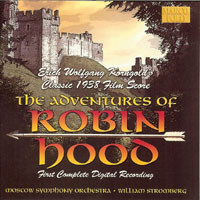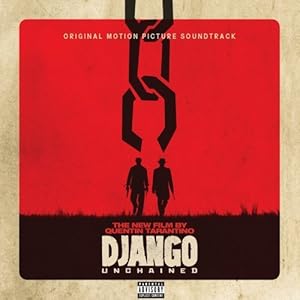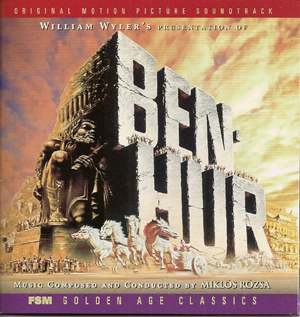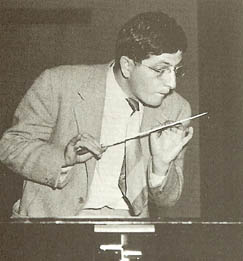Click on the links to read these past editorials:
No. 8: Why is film music from past being neglected?
No. 7: 1955 - a year of noteworthy film scores
No. 6: The summer blockbuster is born with the sound of JAWS
No. 5: What were they thinking back in 1998?
No. 4: Hollywood sells out to extreme violence
No. 3: Who is your favorite film composer from the past?
No. 2: What happened to memorable film music?
No. 1: Herrmann's One-Two Knockout!

Editorial No. 8:
Why is film music from the past getting neglected?
Classic FM in the UK has run polls from their readers over the years focusing on classical music and film music. Basically these are popularity surveys based on listener responses. So they are not necessarily true for the movie-going public in other countries as well. In France, Germany, Ital; or the USA, the poll would probably be much different.
With classical music in general the bias tends to be toward European and American music is often neglected. Naturally UK composers are well represented and that is understandable from a largely UK audience.
But the choices for film music are a bit more difficult to judge. Do people pick a film score that has been popular in the UK, or because they just like the film, or because they like both the film and the music?
Looking at the latest Classic FM survey, what is obvious is that film music from the past is being neglected.
Only 11 out of 100 film scores were selected for scores from 1960 or before.
Yet for 1970 and later there were 70 out of 100 chosen. That seems way out of balance.
I suspect that younger film-goers are not aware of film scores by Alfred Newman, Miklos Rozsa, Alex North, Dimitri Tiomkin or many others who were prominent in the earlier years of film music scoring.
On the survey, Erich Wolfgang Korngold (THE ADVENTURES OF ROBIN HOOD) and Max Steiner (GONE WITH THE WIND) each had only 1 score on the survey.
Surprisingly, Bernard Herrmann had just 2 scores (PSYCHO and VERTIGO) on the survey.
Take a look at the 100 film scores on the survey--
Classic FM Movie Music Hall of Fame
Then look at my list of 100 essential scores --
Click here
How many of these film music titles would you have on your list?
We need to remember film music from all decades not just from 1970 onward.
Roger Hall
12 November 2015

Editorial No. 7:
1955 - A year of noteworthy film scores
While it is true there are many years when "noteworthy" (or exceptional) film scores were released, yet the year 1955 seems a very good year for film music and the Academy Awards.
That year there were three categories for Academy Awards: Best Film Song, Best Scoring of a Dramatic or Comedy Picture, and Best Scoring of a Musical Picture
All five film scores which were Oscar nominated for Best Film Score are worthy of that recognition. They are:
Elmer Bernstein for THE MAN WITH THE GOLDEN ARM
George Duning for PICNC
Alfred Newman for LOVE IS A MANY SPLENDORED THING
Alex North for THE ROSE TATOO
Max Steiner for BATTLE CRY
Though the Oscar went to Alfred Newman that year, I believe that both THE MAN WITH THE GOLDEN ARM and PICNIC were better film scores. Probably the main reason that the Newman score received the Oscar was due to the million-seller hit song (music by Sammy Fain - lyrics by Paul Francis Webster). That was only the third time that both song and score received an Oscar the same year. The first time was for PINOCCHIO (1940) and the second time was HIGH NOON (1952). Though the Alfred Newman score is quite beautiful, it hearkens back to earlier film scores of the 1930s and '40s. The scores by Elmer Bernstein and George Duning are more evocative of the 1950s when scores had less lush orchestration and more edgy music derived especially from jazz models. The themes for THE MAN WITH THE GOLDEN ARM and PICNIC were both hit records.
Here are the five nominees for Best Film Song, with two nominations for lyricist Sammy Cahn and one for another prominent songwriter, Johnny Mercer.
--“I'll Never Stop Loving You,” LOVE ME OR LEAVE ME - Nicholas Brodszky, music/ Sammy Cahn, lyrics.
-- “Love Is a Many Splendored Thing,” LOVE IS A MANY-SPLENDORED THING -
Sammy Fain, music/ Paul Francis Webster, lyrics
--
“Something's Gotta Give,” DADDY LONG LEGS - Johnny Mercer, music and lyrics
--
(Love Is) “The Tender Trap,” THE TENDER TRAP - James Van Heusen, music/
Sammy Cahn, lyrics
--
“Unchained Melody,” UNCHAINED - Alex North, music/ Hy Zaret, lyrics
And the third category for Best Musical Scoring (all of them worthy candidates):
-- Robert Russell Bennett, Jay Blackton and Adolph Deutsch for OKLAHOMA!
--
Jay Blackton and Cyril J. Mockridge for GUYS AND DOLLS
-- Percy Faith and George Stoll, LOVE ME OR LEAVE ME
--
Alfred Newman, DADDY LONG LEGS
--
André Previn, IT'S ALWAYS FAIR WEATHER
There is another trend that began in 1955. The first use of a rock n' roll song to help sell a film, specifically BLACKBOARD JUNGLE. This film opened with "Rock Around The Clock" by Bill Haley and The Comets sung over the Main Titles. This was the beginning of a trend that continued for several decades with Elvis Presley, The Beatles and other rock musicians having their songs featured with the opening Main Titles or elsewhere in the film.
With such a wealth of worthwhile film music is it any wonder that the decades from the 1930s to 1950s are called the Golden Era of Hollywood films.
Roger Hall
30 October 2015

Editorial No. 6:
The summer blockbuster is born
with the sounds of JAWS
"The Nation's No. 1 Best-Selling Book now the Screen's Super Thriller"
That was the headline printed across the LP album for JAWS in 1975 when it was first released.
In much smaller print at the bottom of the LP cover it reads:
"Music composed and conducted by John Williams"
But is that really fair to put the composer's name so small on the cover? With what we now know about this film music master you might say - No. The LP album went on to be awarded a Grammy for Best Soundtrack Album.
By the time of the CD anniversary release in 2000, the name of this film composer was listed in bold type (shown above) as it should be, since he has achieved so much in that time. Though John Williams had been composing film music since the 1950s, especially for television, and for some films in the 1960s and early '70s, JAWS was his first really big score which received a lot of attention.
Now in its 40th anniversary year there is a renewed recognition of this first big summertime blockbuster and the first film to break the $100 million mark at the box office.
What made JAWS so successful with audiences in 1975?
In a recent excellent Boston Sunday Globe article about the 1975 films by Mark Feeney, he describes this blockbuster film very succinctly:
It's witty, scary, very well acted by (by Roy Scheider, Richard Dreyfuss and Robert Shaw), and memorably scored. John Williams's two-note bass ostinato is the ultimate oceanographic nightmare.
Though the bass ostinato is actually three notes and is heavily accented with irregular rhythms, most people hear the two notes because that's how it begins. The mention by Feeney demonstrates the importance of that theme to the success of JAWS. After all, that was the main character of the story, represented by the mindless movement of that formidable sea creature in the waters off Amity Island -- actually mostly filmed on Martha's Vineyard, Massachusetts, where it is still remembered and some of the residents still receive royalty checks. It is fair to say that ever since this movie was released there has been an increase in fear about possible shark attacks.
In the CD booklet with the Anniversary Collector's Edition from 2000, John Williams offers his thoughts on composing the music for JAWS. He begins:
When I first saw JAWS, it was clear to me that it would require an action/adventure score...Most of the discussions I had with Steven were about the shark. The challenge was to find a way to characterize something that's under water with music rather than with sound effects. These low thumping notes were the result. I thought that alternating the speed and volume of the theme, from very slow to very fast, from very soft to very loud, would indicate the mindless attacks of the shark.
Back in 1997, a fellow reviewer from the UK, the late David Wishart, wrote on the FILMUS-L message board, a very perceptive reason for this very effective Shark Theme. David wrote:
There have been a lot of suggestions regarding the origin of John Williams' shark motif for JAWS - but didn't Williams say that he conjured the motif out of the book's opening line -- where the attacking speed of the shark was likened to an express train (or something similar)...Let us not forget we do not see the shark until a good way into the movie; a simple musical motif was needed to represent the shark in the audience's mind until that fateful first appearance - and Williams motif works perfectly in this respect.
So, it is that Shark motif which helps to set up the suspense and helps to keep the audience on edge when that motif is heard.
The other music in this score is also outstanding, especially when the three characters are on the boat in search of the Shark. The music is almost always animated and exciting and keeps the audience on edge for the oncoming danger of shark attacks.
Williams had received his first Oscar in 1971 for his arrangements and underscoring for the musical film, FIDDLER ON THE ROOF. As Williams was quoted in the CD booklet:
But JAWS was the first Oscar I received for my own music, and that was a significant moment for me. .
And it was also a significant moment for film-goers and film music fans as well.
Not only was JAWS considered the first summer blockbuster and top-grossing film of that time, until it was beaten just two years later by STAR WARS (with another well deserved Oscar for Williams), it was also the beginning of the blockbuster film score.
Of course, there had been major large-scale film scores in the past, such as GONE WITH THE WIND (Max Steiner was robbed of his Oscar for that landmark score), CITIZEN KANE (Bernard Herrmann), BEN-HUR (Miklos Rozsa), SPARTACUS (Alex North), to name just a few.
But JAWS was different because it was for a different type of film.
Unlike all the previous large scale films, which were most dramatic stories, JAWS was a perfect summertime thrill-ride -- fast-moving and fizzy with sudden shocks to keep the audience tuned in to the story. Today, summertime blockbusters are mostly just the action with an overload of special effects from comic book characters without a believable story and acting that is not that good. Just because these CGI films make a ton of money doesn't mean they are worth seeing again or remembering them after many years like JAWS.
The direction by Steven Spielberg, although the film almost drove him crazy, is deserving of a good deal of credit for its success. He was and still is, a master storyteller, keeping the audience excited and highly entertained.
But, for me and probably other fans of this film, it was the Williams film score which really brought the most thrills and kept the tension growing. After all the excitement, Williams brought in a beautiful theme of peace and tranquility at the end of the film.
Did the Shark theme resonate with the audience? To quote Williams again:
If I just play two notes of the JAWS theme, people immediately recognize it. I think it's wonderful when these kinds of musical associations are created and when they make an impression on an audience..
So is it fair to say that the sounds in JAWS made the most impact in this summer blockbuster?
I'd say a resounding YES and thanks to John Williams we have had many more years and films with his high quality film scoring over the years.
But it all began with the sounds from JAWS -- the first big blockbuster film score..
Roger Hall
24 August 2015
Recordings mentioned in this article:

LP album: MCA Records MCA-37171, 1975

CD 25th Anniversary Collector's Edition: Decca 299-467-045-2, 2000
(with 12 tracks containing previously unreleased music)
See also:

Film Music Master: A Tribute to John Williams

Editorial No. 5:
What were they thinking back in 1998?
Back in the year when Film Music Review began, I ran an open poll for Online readers to see which film scores from the past would be picked. Since this list was posted fifteen years ago it hasn't been available Online for a long time. Now I'm reprinting it for your consideration.
Please remember these are not necessarily my choices although many of them are on my 100 Essential Film Scores list.
This list below does confirm the general view among film score followers that Bernard Herrmann was the most influential composer from that time (5 of his film scores are on the list). It also reflects a shortage of film scores from the 1930s and 1970s-- only the expected title from the multitudes of STAR WARS fans. Even with this shortage, the other decades are pretty evenly distributed: 1940s (4 titles), 1950s (6 titles), and 1960s (5 titles).
I think this remains a very good sampling of great film scores from the 1930 to the 1970s.
Here are the top ten vote getters listed in reverse order:
10. (7 way tie - all with the same number of votes)
THE DAY THE EARTH STOOD STILL - Bernard Herrmann, 1951
THE DIARY OF ANNE FRANK - Alfred Newman, 1959
EL CID - Miklos Rozsa, 1961
FAHRENHEIT 451 - Bernard Herrmann, 1967
PSYCHO - Bernard Herrmann, 1960
THE SEA HAWK - Erich Wolgang Korngold, 1940
SPARTACUS - Alex North, 1960
9. (3 way tie)
THE ADVENTURES OF ROBIN HOOD -Erich Wolfgang Korngold
HIGH NOON - Dimitri Tiomkin, 1952
SPELLBOUND - Miklos Rozsa, 1945
8. THE BEST YEARS OF OUR LIVES - Hugo Friedhofer, 1946
7. PLANET OF THE APES - Jerry Goldsmith, 1968
6. (2 way tie)
THE BIG COUNTRY - Jerome Moross, 1958
TO KILL A MOCKINGBIRD - Elmer Bernstein, 1962
5. THE GHOST AND MRS. MUIR - Bernard Herrmann, 1947
4. VERTIGO - Bernard Herrmann, 1958
3. BEN-HUR - Miklos Rozsa, 1959
2. STAR WARS - John Williams, 1977
1. KING KONG - Max Steiner, 1933
Roger Hall
7 March 2014

Editorial No. 4:
Hollywood sells out to extreme violence
One of the industry's biggest stars, said as he promoted Quentin Tarantino's ultra-violent spaghetti Western-style film about slavery, DJANGO UNCHAINED, that actors can't ignore the fact that movie violence can influence people.
"We cannot turn our back and say that violence in films or anything that we do doesn't have a sort of influence," Foxx said in an interview. "It does." Bravo to you, Jamie Foxx!
It's about time an actor spoke up about the glut of violent movies that have been flooding into the theaters in the past few years. The movies have become increasingly violent especially
showing graphic mayhem and excess blood-letting. For what purpose? Shock effect or to give some cheap thrills to the audience? Isn't there enough violence and killing in real life?
I believe the fault lies with greedy film producers and warped directors like Quentin Tarantino, who are praised by critics but are morally corrupt.
It's time there was a return to films that have a more positive story and are also well acted, like LINCOLN, with an excellent score by John Williams, rather than mindless repetition in a score, like for the vastly overrated James Bond film, SKYFALL, with a disappointing score by Thomas Newman, or the patched together soundtrack of music by many composers, like in the excessively bloody film, DJANGO UNCHAINED.
In emphasizing violence the money handlers have sold themselves out by appealing to the lowest level of moviegoer who seem to carry out their bad behavior elsewhere, especially on the Internet.
Some experts have said that violent films (also violent film music scores) have no effect on the weak-minded or angry people?
I don't buy that.
Both films and their music probably do affect some in the audience and not in a positive way. Just think of some of the mass murderers and their fascination with rapid-firing guns. It's hard to dismiss their fascination with graphic violence shown in films and on cable TV.
I refuse to go along with that tired old expression: "It's only a movie and make-believe." Yeah, but how does it affect weak or sick-minded people about killing? They know their mass killings make it likely they will be mentioned repeatedly in a media frenzy?
I'd like to see a law passed where these mass murderers are not mentioned by name in any media source. But that will probably never happen in the U.S. and the killings will continue and media outlets will rush to make these murderers headline celebrities.
Will we see more films of healing and hope and less with thrill killing and extreme bloodshed in future years? It seems unlikely anytime soon.
My way of protest is refusing to watch and especially pay any money to watch excessively violent films, either in theaters on on cable TV.
I'm not into supporting the selling of extreme violence.
Roger Hall, FMR Managing Editor
5 January 2013

Editorial No. 3:
Who is your favorite film composer from the past?
If you are a film music fan or collector or (in my case) a critic, this is a very tough question to answer. Do you pick one of the acknowledged film music masters, like Bernard Herrmann, Erich Wolfgang Korngold, Alfred Newman, Miklos Rozsa, or Max Steiner? Or, these three film composers: Elmer Bernstein, Jerry Goldsmith, David Raksin. Any of these film composers would be great choices and I admire them all. Of course there are others also deserving of high praise.
But in my case, I would pick the film composer who I noticed the most when I was a regular movie goer back in my kid days -- Dimitri Tiomkin [shown in the above picture at the piano].
His score for HIGH NOON was one of the first dramatic films whose score and title song were both very popular. It was also one of my favorite early films since I was a huge western fan when that film was in the theaters. There are many other Tiomkin scores I like and they include these which have reviews: THE ALAMO, D.O.A., THE FALL OF THE ROMAN EMPIRE,
LAND OF THE PHARAOHS.
I had the pleasure to write an article for the now defunct Soundtrack magazine about Tiomkin's "Golden Decade."
Some movie fans might say their tastes change from day to day so they couldn't pick just one favorite? Of course your choice might change. Yet not picking anyone is a cop-out that is all too common among those who don't want to pick just one so they don't choose to name anyone.
Okay, I picked my favorite film composer from the past, now what's yours?
Roger Hall
10 December 2012

Editorial No. 2:
What happened to memorable film music?
There are those among today's film-goers, especially the younger ones, who think that almost anything they hear today in a film soundtrack is memorable. They might list the scores to INCEPTION or THE SOCIAL NETWORK as examples. But are they really very memorable?
What really makes one film score so memorable and others just fade away?
Just think of these memorable theme examples from the past century:
GONE WITH THE WIND - Max Steiner, 1939
LAURA - David Raksin, 1944
HIGH NOON - Dimitri Tiomkin, 1952
BEN-HUR - Miklos Rozsa, 1959
PSYCHO - Bernard Herrmann, 1960
SPARTACUS - Alex North, 1960
JAWS - John Williams, 1975
PATTON - Jerry Goldmsith, 1980
What makes them so memorable? It's usually a theme which stays with you after you've seen the film. That is what is lacking in so many of today's new film soundtracks with loud and uninspiring electronic-techno music taking the place of a full orchestral score with memorable themes. Naturally there have been exceptions in the past decade or so such as:
Elmer Bernstein - FAR FROM HEAVEN, 2001
James Newton Howard - THE VILLAGE, 2004
Michael Giacchino - UP, 2009
John Williams - WAR HORSE, 2011
For those who have more or less given up on today's film music, there are still lots of vintage film soundtrack CDs being released each year.
So do you prefer vintage film soundtracks or the latest ones from today's films?
It's your choice but what matters most is that the best film music will (and should) live on. The other stuff will be forgotten.
Right now, there are lots of CDs being released of soundtracks and some I would call just junk music. For instance, who would have guessed that Clint Eastwood's four note "score" to MYSTIC RIVER would be so highly regarded? Does he deserve to be lauded for his film scoring? I say - No.
But rather than gush over a celebrity actor-director, I'd prefer a memorable soundtrack like John Barry's BODY HEAT or Bernard Herrmann's NORTH BY NORTHWEST, or John Williams for almost any film score he has composed. These are the composers that deserve highest praise for writing memorable film music.
Clint Eastwood can continue to talk to an empty chair and make his angry old man movies.
I'd rather spend my time listening to memorable film music.
Roger Hall
30 September 2012

Editorial No. 1:
Herrmann's One-Two Knockout!
The latest poll of over 1,000 film critics and writers as reported in the BFI's magazine, Sight & Sound, have at the top two films with scores by Bernard Herrmann.
What for decades was the No. 1 choice, CITIZEN KANE (1941),
has been replaced by VERTIGO (1958) . Both are on my top ten list of Herrmann's favorites.
Respected film critic, Ty Burr, writing in The Boston Globe (18 August 2012) asks the important question: "Is VERTIGO really the greatest film of all time?"
My simple answer would be -- No.
I believe CITIZEN KANE should remain at the No. 1 spot where it has been for decades. While this poll might appear to be highly erudite and elitist, it is really a desire to highlight the films of greatest substance over superficial effects and dopey dialogue. No DARK KNIGHT or AVATAR here! That's because, as Ty Burr ends his piece writing:
"In fact, it's a reminder that there's much more out there than burgers and fries."
I'm one of very few critics (perhaps the only one) who also believes that CITIZEN KANE has the greatest score of any Hollywood film and it tops my list of 100 essential film scores of the 20th century.
But Herrmann's one-two punch in the Sight & Sound poll makes him the
Film Music Heavyweight Champion.
Bravo, Benny!
Roger Hall
20 August 2012
For comments on any editorial on this page, write to:
Film Music Review
For your reading and listening enjoyment!
Now you can help support Film Music Review
and receive the film music guide
with CD reviews and film composer tributes,
plus several music albums and video programs on a computer DVD.
To get your copy click the link below...
